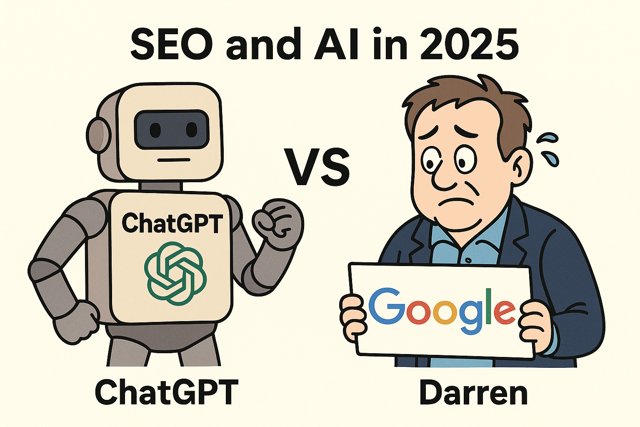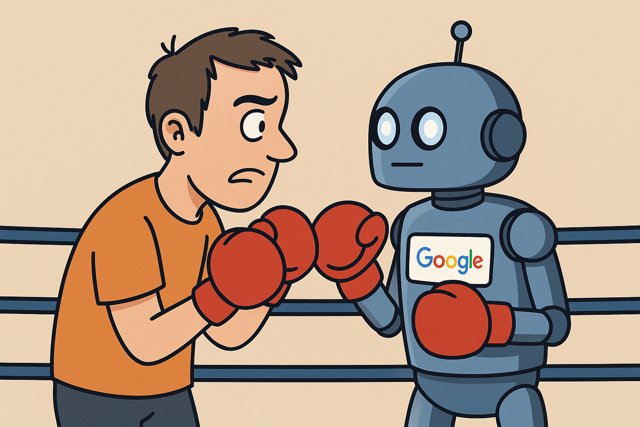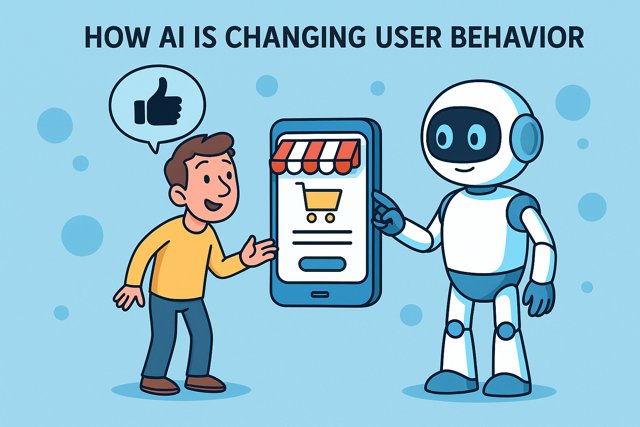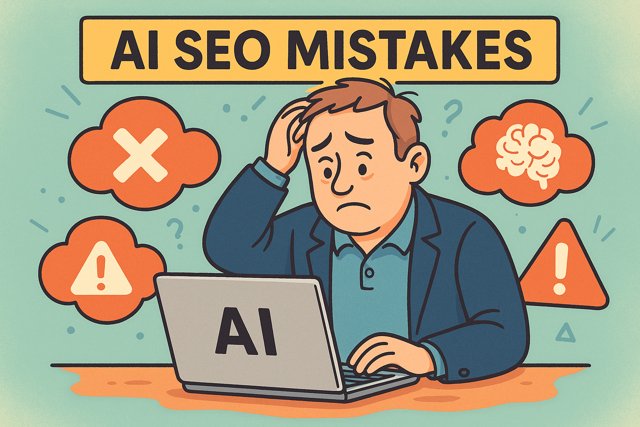
Introduction: The Darren Dilemma in an AI-Driven World
This is Darren and he needs to get into SEO and AI — he’s a bloke who used to believe uploading a 20 MB trout JPEG was SEO gold. But that was before AI changed everything. In 2025, tools like ChatGPT, Bard, and AI-powered answer engines have reshaped how people search. So if Darren spent years obsessing over “Buy cheap carp rod UK,” he’s now facing a new nightmare: his customers skip Google and ask AI directly.
His mate Dave doesn’t bother with Google much anymore. Dave just asks ChatGPT or his voice assistant and gets instant answers. Darren knows he needs to adapt or vanish.
So the question we’re asking today: Is ChatGPT killing Google Search? More importantly, how should small businesses adapt—especially folks like Darren selling fishing tackle online?
1. The Rise of AI Search & Why It Matters
1.1 Stats You Can’t Ignore
- Over 40% of mobile searches in the UK start through AI-driven assistants, not traditional Google Search.
- ChatGPT’s API usage grew by 350% in the past year, showing huge adoption.
- A 2025 user survey found that 35% of people prefer AI over Google for quick how-to queries.
While Google still handles billions of queries, AI-first searches are steadily eating into its market share.
1.2 Why Darren Should Give a Crap
Imagine someone in Chester asking: “Carp rod recommendations under £50.” If they type it into Google, they might land on Darren’s e-commerce page. But if they ask ChatGPT: “Hey AI, where can I buy a decent carp rod under fifty quid?” — Darren’s site needs to be represented in that answer or risk disappearing altogether.
Dave, Darren’s mate, is already asking AI everything from recipes to product tips and hardly Googles anymore.
2. What Is ChatGPT and How Does It Work?
ChatGPT is an AI language model developed by OpenAI. It’s like a digital mate you can ask anything, and it spits back human-like answers in seconds. Unlike Google, which serves links, ChatGPT gives direct answers — no clicking around needed.
It works by analyzing billions of texts from books, websites, and articles, then predicting the most likely answer based on your question. It’s conversational, so users like Dave feel like they’re chatting with a knowledgeable friend.
This shift means that instead of browsing multiple sites, people often get their answers from AI chatbots — a huge change Darren is still wrapping his head around.

3. Google’s AI Search: Not Dead Yet
Google isn’t sitting still. It has integrated AI features like Bard, and AI-powered “helpful content” algorithms that filter out fluff. Google’s goal is to blend traditional search results with AI-generated summaries, giving users the best of both worlds.
Darren noticed his competitor’s sites showing up in Google’s new AI answer boxes. He knows he needs to optimize for these AI snippets to stay visible.
3.1 Why Are People Turning to ChatGPT Instead of Google?
Darren’s mate Dave is typical of a growing crowd. Dave rarely bothers with Google anymore—he just fires questions at ChatGPT or his voice assistant. “Where can I find a good carp rod near me?” or “What’s the easiest fishing bait to use?” Dave gets instant, conversational answers without scrolling through pages of links.
Why? Because AI provides quick, to-the-point replies. People are impatient, and AI chatbots deliver exactly what you ask for, fast. No fluff, no multiple clicks. This changes user behavior drastically: fewer page views, more reliance on AI summaries.
For Darren, this means the traditional “SEO wins by being on page one” model is evolving. If AI doesn’t cite Darren’s site or pull info from his blog, he could lose traffic without even knowing it. It’s not about beating Google anymore — it’s about being the source AI trusts to answer users directly.
3.2 How Google’s AI Search Is Fighting Back
Google isn’t giving up its throne easily. It’s fighting back by integrating AI directly into its search engine with features like Bard and AI-powered snippets that summarize content without sending users off-site.

Darren noticed these AI-enhanced results appearing on his competitor’s pages—sometimes even pushing his site lower in traditional rankings. Google’s approach blends classic search results with AI-generated answers, hoping to keep users on Google longer.
This means Darren has a dual challenge: optimizing for both traditional SEO and Google’s new AI features. He needs to structure content for snippet eligibility, add FAQ schema, and focus on clear, authoritative content that AI will pull from.
Google’s AI search aims to give users the best of both worlds—fast answers and rich links. For Darren, keeping pace means mastering this hybrid SEO-AEO game or risking irrelevance.
4. SEO vs AEO: Dual Strategies You Must Use in 2025
4.1 What’s AEO?
Answer Engine Optimization (AEO) is about creating content AI can easily digest and use in answers. It complements SEO but requires more conversational phrasing, structured FAQs, and schema markup.
| Strategy | Focus | Goal |
|---|---|---|
| SEO | Keywords, backlinks, technical health | High SERPs ranking |
| AEO | Conversational phrasing, structured FAQs, featured snippets | Inclusion in AI responses |
4.2 Darren’s Hybrid Strategy
Darren now writes:
- Conversational blog posts like “Hey AI, what’s the best carp rod for beginners?”
- FAQ sections with schema markup.
- Internal links that help AI and users navigate his site.
5. How AI Is Changing User Behavior

People like Dave want answers now. No scrolling, no clicking multiple links — just quick, clear advice. Voice assistants and chatbots make this possible, and they’re only getting better.
This has made search more interactive and conversational. Darren has to think like a human answering questions, not a website stuffed with keywords.
6. Updating SEO in an AI World: What Darren Learned
6.1 Conversational Keywords
Old-school “cheap fishing rod UK” is out. Darren targets natural questions like:
- “What’s the best carp rod for beginners in the UK?”
- “Affordable fishing tackle for bank fishing”
- “Is carbon carp rod worth it?”
6.2 User Intent is King
AI extracts precise answers, so Darren structures content as:
- Q&A format
- Step-by-step how-tos
- Clear, direct responses to common queries
7. Technical SEO: Still Mandatory
Despite AI changes, old-school SEO basics still apply:
- Page Speed: Darren targets under 2 seconds on desktop, 3 on mobile.
- Mobile First: His site adapts to all screen sizes.
- HTTPS: Secured with Let’s Encrypt.
- Schema Markup: Product, FAQ, and review schemas added.
If Darren’s site isn’t fast, secure, crawlable, and structured, no AI or SEO trick will save it.
8. Structured Data & FAQs: ChatGPT’s Best Friends
ChatGPT loves schema. Darren adds:
- FAQPage schema
- Product schema (price, stock, ratings)
- Tests using Google’s Rich Results tool
This boosts visibility in AI-generated answers.
9. Off-Page and Brand Signals for AI Validity
AI models trust sites with authority signals:
- Backlinks from blogs, Reddit, forums
- Brand mentions in niche publications
- Social visibility from helpful posts
When ChatGPT answers “UK carp rod tips,” it pulls info from trusted, linked content — like Darren’s site after he earned some good links.
10. Monitoring Results: Analytics for the New Era
10.1 What to Track
- Keyword rankings in SERPs
- AI answer box inclusions
- Referral traffic from AI tools
- Rich snippet presence
10.2 Tools Darren Uses
- Google Search Console
- Ahrefs
- Weekly ChatGPT queries to test how he appears
11. Common AI SEO Mistakes — What Darren Almost Did

- Chasing quick AI content with no edits
- Ignoring quality for quantity
- Failing to update technical SEO for AI compatibility
- Not building real backlinks or brand trust
12. FAQs About SEO & AI
Q1: Will ChatGPT replace Google Search?
Not entirely. SEO still matters but has evolved.
Q2: Do I still need blog posts?
Yes, especially with FAQs and how-tos for AI.
Q3: How to optimise for AI search?
Answer questions clearly, use schema, write conversationally.
Q4: Does schema improve AI ranking?
Yes, AI picks schema content more reliably.
Q5: Should I invest in AI chatbots?
Yes, Darren saw 22% more engagement after adding one.
Q6: How does off-page SEO impact AI search?
Authority and backlinks still matter for AI trust.
Q7: Can AI tools help with content?
Yes, but always add your own voice and check quality.
13. Story Time: Darren’s Success
In early 2024, Darren’s traffic dropped 35%. Not in AI answers, sales flat. He:
- Added schema and FAQs
- Published “How to pick a carp rod with ChatGPT”
- Improved site speed
- Earned links from niche sites
By mid-2025, his SERP rank jumped from #17 to #4, featured in AI responses, and sales increased 42% YoY, thus buying himself and his seo expert loads of beers and peanuts.
14. Keywords to Target
- best carp rod 2025 UK
- affordable fishing tackle online
- how to choose carp rod beginners
- ChatGPT fishing rod guide
- on-page SEO small business UK
- AI search engine optimisation
Conclusion: Adapt or Disappear
Is ChatGPT killing Google Search? Not really — it’s changing how we get found. Businesses like Darren’s must build content both search- and AI-friendly. Darren nearly vanished ignoring AI, but now his structured content and brand mentions get him found in AI answers, well done Pedro.
Get ahead: tidy your on-page SEO, add schema, create useful FAQs, and embrace Answer Engine Optimization. Be like savvy Darren — not clueless Darren.
Leave a Reply